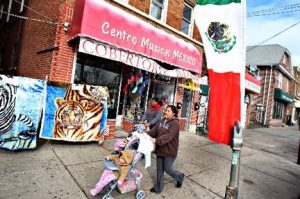The Commodity Identity: Labor Exploitation and Convict Lease Parallels
One of the phrases that really resonated with me from this week’s reading on Migrant “Illegality” in the United States was the stigmatization of Mexican migrants as “commodity identities” (De Genova, 435). Indeed, when I think about the stereotypes in popular culture regarding Mexicans, these individuals are often either portrayed as criminals or as commodities. They are subjects of labor exploitation “validated” by the fact they are, in legal terms, “aliens” in American society.

French Street, New Brunswick
I grew up 10 minutes away from French Street in New Brunswick, a city in New Jersey that harbors a notably large number of “illegal” Mexican migrants. I knowingly and unknowingly have had interactions with these individuals my whole life—they are my family’s and neighborhood’s landscapers, cleaning ladies, movers and handymen. As I grew older and became more aware of these situations, I realized that there is an invisible contract between the “legal” and “illegal” communities that continuously oppresses “illegal” constituents to their commodity alien identities. We don’t ask for papers, we ask for services, and these individuals “serve,” bargain, but ultimately accept the rates proposed by the consumer, however unfair the price may be, because they simply don’t have a choice.
I think the labor exploitation of Mexican migrants can arguably be paralleled to the convict lease system that was established in this country post-reconstruction era. “Slaves” were being unfairly pursued, framed, and imprisoned for harmless violations or simply occupying the same space of their social superiors, and then contracted out to different companies and wealthy business owners for labor at cheap rates. This “legal” system of labor and imprisonment fueled the stereotypes associated with black people — “criminals” or menial job workers. What is scary was that this was legally acceptable, and while the system no longer exists, we have quietly reinstituted it in a less severe form upon a new community whose “crime” is crossing borders for a better life. I completely acknowledge that black history in this country is complex and cannot completely be paralleled with that which Mexican migrants have experienced, yet it is truly striking to see how society continuously criminalizes and economically exploits different communities throughout time.
Recent Comments